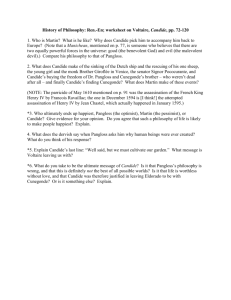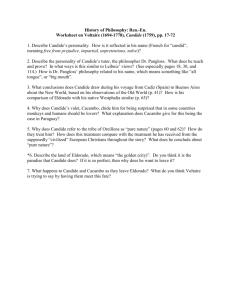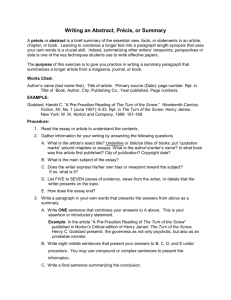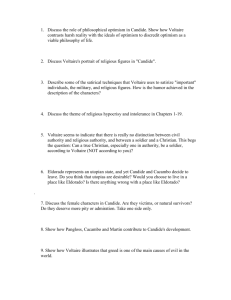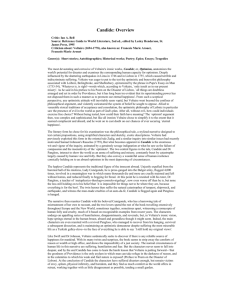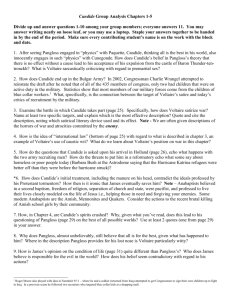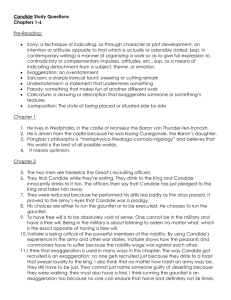Voltaire
advertisement
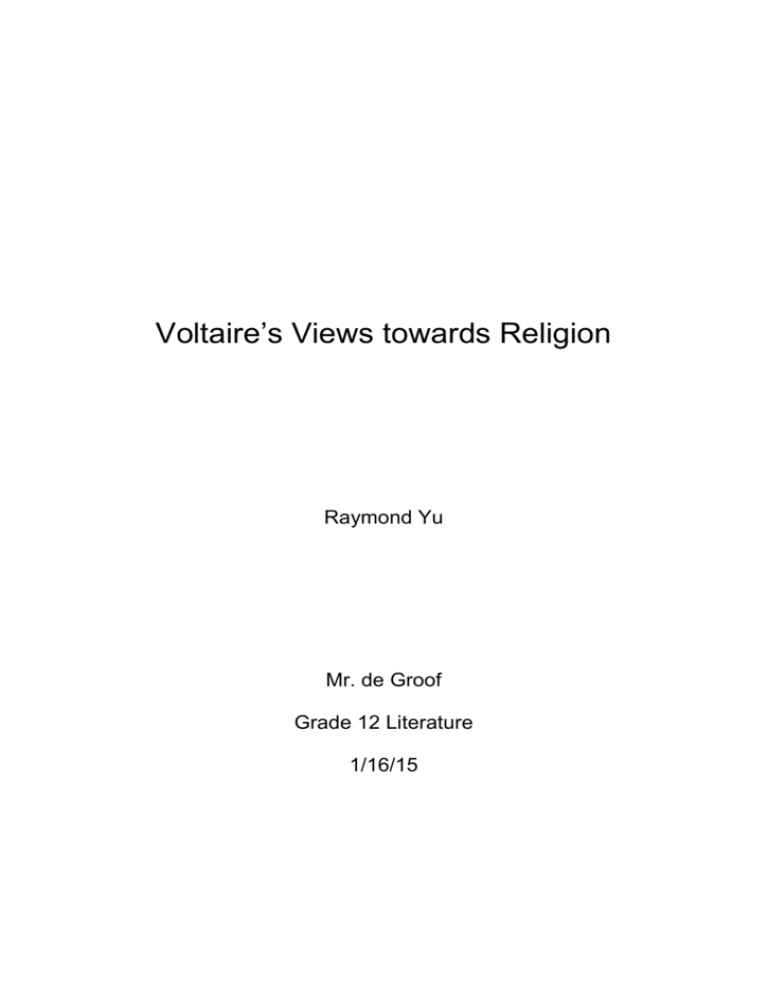
Voltaire’s Views towards Religion Raymond Yu Mr. de Groof Grade 12 Literature 1/16/15 Raymond, 16, 3Geng Voltaire, a French enlightenment writer, expressed his opinions on religion in his satire Candide. Voltaire himself is a faithful believer of God, as many would consider him as a deist. He does not oppose religion, but is against people abusing religion, using the name of religion for their own good. He also advocates religious tolerance, and believes that different religious groups should not be fighting wars among each other. Most of the religious characters in Candide, except a few such as Jacques the Anabaptist, were portrayed negatively. Furthermore, every organized religious group seems to be vicious and detrimental to the society. By using the incidents in Candide’s journey, Voltaire demonstrated how ridiculous a religion and their believers could be. Throughout Candide, Voltaire criticized Leibnez’s belief of “best of possible all worlds”. Pangloss was one of the firm believers of Leibnez’s theory and teaches the theory to Candide. Pangloss thinks that “things cannot be otherwise than they are, for since everything is made to serve an end, everything necessarily serves for the best (p.2)”. However, Pangloss was infected with syphilis and was almost killed by the disease. Then, he experienced a shipwreck, encountered a huge earthquake and was hanged. Everything that happened to him seems to contradict with his theory of “best of Raymond, 16, 3Geng possible worlds”. However, even in the end of the story, after he has been through and saw so many awful things in the world, he still insists on his theory. Voltaire uses this to show the stubbornness of the believer of Leibnez’s theory -- the world is full of injustice, killing and raping, but they still believe that there is no way the world could be a better place. By Pangloss’ story, Voltaire urges people to stay open-minded and do not excessively believe in a theory. Christianity was also criticized in Candide. When Candide arrived in Holland, “having heard that everyone that everyone in that country was rich and Christian, he felt confident of being treated as well as he had been in the castle of the baron”. However, instead of meeting with benevolent Christians, he was intimidated by an orator. The orator was speaking about charity, but in fact does not even give the poor Candide a piece of bread. This shows that saying and doing is a completely different case. Religious leaders, or in this case orators, often teaches others a thing but does another. The Grand Inquisitor is also an example of abusing religion. The Grand Inquisitor is one of the leaders of the Catholic Church. However, he has the exact opposite characteristics as one would expect a leader of a religious group should have. He was lustful and uses the power his religion gave him for his own good. He wanted to get Cunegonde from a Jew named Don Issachar, Raymond, 16, 3Geng so he held an auto-da-fe to threaten Don Issachar. Many innocent people died in the auto-da-fe just because he wanted a girl. The Grand Inquisitor’s immoral actions demonstrated the corruption in a religion, and the abusing of religious power. Another example of religious leaders abusing religion is showed when Candide went to Paraguay. In Paraguay, Candide found out the reverend father, the Jesuit which controls that region, is his lover Cunegonde’s brother. Nevertheless, the reverend also has a heinous characteristic. He is arrogant and ranks himself above all other people. He is racist and refused to talk to certain kinds of people. Also, he showed no respect when Candide entered the room and when Candide expressed his affections towards Cunegonde only because Candide’s social ranking is not high enough. The most important of all, the Jesuits fought the war not because they wanted to help the native, but for their own good. People like Candide might think the reason for fighting the war is good, and those Jesuits are beneficial to the region. In fact those Jesuits are actually selfish and the natives actually hate them. Voltaire used this part to show the deceitful nature of organized religion. They would often use the name of helping people to benefit themselves. The purpose behind their actions was often not as good as one may think. Raymond, 16, 3Geng Voltaire pointed out another problem within an organized religion when Candide is at Venice. There, Candide met Brother Giroflee, and he told Candide his story. “My parents forced me when I was fifteen years old, to put on this detestable robe, so they could leave more money to a cursed older brother of mine(p.58)”. At that time, many people were forced to believe a religion, such as being baptized in an early age. In Giroflee’s case, Giroflee’s parents see religion as a way to get money. Thus, religions loose its original intentions. While most of the religious characters in Candide were portrayed negatively, there were still few exceptions. The most important one was Jacques the Anabaptist. He is a faithful man and willing to help others. He aided Candide and saved Pangloss. He is tolerant towards other beliefs. Although Pangloss holds different opinions from him, he still treats Pangloss well. Despite the fact that Jacques was one of the few good people in this story, he did not stay alive for long. He died because saving an obnoxious sailor who only did harm to the society. Voltaire used Jacques’ story to remind us that we should not deny the fact that there are still good individuals within a religion. However, those good individuals were often whether unseen by the public or trampled by the corrupted individuals. Raymond, 16, 3Geng Candide, the main character in this story, stands for the common people in the society. Most people in Europe at that time were born to believe in Christianity, just like Candide believed in Pangloss’ theory since he was small. Also, most of the people could not see the corruption and the flaws of the church, just as Candide continues to believe that Pangloss is right despite everything went the opposite way. Nevertheless, in the last chapter of the story Candide said to Pangloss after Pangloss explains his big theory “That is very well put, but we must cultivate our garden (p.75)”. Candide finally dismisses Pangloss’ theories and realized the importance of being practical. Voltaire expects common people to come to the realization that there might be some flaws in their beliefs just like Candide. Religion is one of the main themes in Candide. Voltaire expressed his ideas and raised opposition on certain aspects of religion. He fully demonstrated how humanity tainted religions. By using satires and exaggerations, Voltaire sufficiently showed the chaos and harms that excesses and abuses of organized religion could bring to the society.
